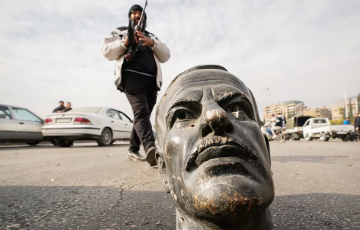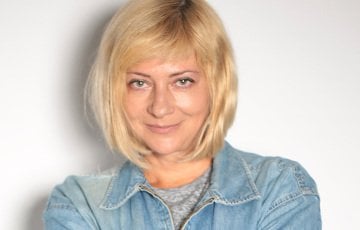Putin And Lukashenka Are Hysterical: Assad's Fall Could Trigger Domino Effect
56- 9.12.2024, 12:54
- 66,350

We are witnessing the beginning of the collapse of Russia.
The regime of Bashar al-Assad in Syria has fallen. The dictator, whose family had ruled the country since 1970, fled. How is the balance of power changing in this complex region? Will Assad's defeat be a blow to Russia? Will Putin protect Lukashenka?
Dzmitry Bandarenka, the coordinator of the European Belarus Civil Campaign, spoke to Charter97.org about this and more:
— Absolutely no one expected that the Assad regime would fall in just three days. First, and most importantly, it is an example of the fact that it is impossible to hold power by force for a long time without popular support.
Secondly, let it be with foreign assistance, but it was the Syrian rebels of various ideological trends who fought against Assad for many years and won.
Israel's strikes on Hezbollah (the practical destruction of it as a military force), strikes on the warehouses of the Iranian army and the Shiite militia from Iraq, led to the destruction of the military machine supporting Assad.
It must be remembered that both the elder Assad, who ruled Syria for 30 years, and his son belong to the Alawites. They only recently began to be considered a branch of Shiism, and in fact they trace their ancestry back to the so-called Ismailis, whom many do not consider Muslims. The Alawites in Syria needed to ensure that Shiite theologians recognized them as Shiites, because in the Syrian Constitution only a Muslim can be president.
Therefore, Assad was able to become president, enlisting the support of Iranian theologians who recognized the Alawites as Shiites. This is an important point because 75% of Syrians belong to the Sunni branch of Islam.
At first, Assad could hold power with the support of the USSR. We know that the Party of Arab Socialist Revival at one time was very strongly supported by Moscow with weapons. It was such a dictatorship of Arab pseudo-socialism, and when the USSR collapsed, it became difficult to hold on to power. In 2011, the people revolted as a result of the Arab revolution, but here Iran came to the aid of the younger Assad.
Now, after the fall of Damascus, Iran's position in the region has greatly weakened. This is an unconditional victory for the leaders of the Sunni world — Saudi Arabia and Turkey. This, of course, does not mean that peace will quickly come there, that everything will be wonderful. Turkey has big problems with the Kurds, the Arab rebels also have difficult relations with the Kurds, but all are united in one thing: the main country that lost is Putin's Russia.
We know that Syria was such a “jump base” for Putin's operations in Africa, and now it is almost lost. This will affect Russia's interests in Africa and, if possible, support dictatorial African regimes.
Today, much will depend on the policy of France, because historically the territory of the Levant — Lebanon and Syria — was in the area of responsibility of this country. If France and the UK take decisive steps to transform the region, chaos may be avoided.
— Russia is likely to lose its military bases in Syria. Once the USSR had to withdraw troops from Afghanistan. And we all know where that led the world. What will be the consequences this time?
— The fall of Damascus in three days showed the weakness of Russia, and what I and many analysts talked about — Russia is incredibly weak. Today, it has no resources either for the war in Syria, or for operations in Africa, or for the war in Ukraine. This needs to be understood. Putin just doesn't have the money.
It turned out that the "non-working sanctions" were working, the friendship with the "great Iran" in this region, all Russia's strategic actions for decades, simply collapsed.
On the other hand, we can say that the collapse of the USSR continues. In Libya, too, the Gaddafi regime collapsed, and now the Assad regime has collapsed, because Putin has no money, resources, military power. He's bluffing.
He's incompetent as a manager. Russia could have had about $6-8 trillion of GDP today if it had not gotten involved in military conflicts, starting with Georgia, and had not pursued a policy of confrontation with the West.
Now its GDP ranges from one and a half to two trillion. Russia already barely survived, and now it has unleashed these wars. We see her agony. The most important thing is a demographic catastrophe. For a lot of money, people from the hinterland are ready to fight, but this fatally undermines the Russian economy.
— Donald Trump reacted interestingly to the events in Syria. He stated the weakness of Russia and the Russian economy, which caused the defeat in Syria and huge losses in Ukraine. Before the election, he spoke of a strong Russia. Why such a change of rhetoric?
— I heard in his statement that "we need to save Vladimir faster," as he often calls Putin. Trump's words that “Ukraine needs to make peace faster in any way” reminded me of the famous speech of George Bush Sr. in 1991, which went down in history as “Chicken Kyiv” or “Chicken Kyiv speech”. When the USSR collapsed, George W. Bush urged Ukrainians to “support Gorbachev” and “not to show nationalism.”
Trump's statements are very reminiscent of those words. It turns out that his advisers simply miscalculated, and most importantly — they do not understand that Putin is bluffing and is more weak than ever.
I have hope that Trump will deliver on one of his promises. "There will be no peace in Ukraine 24 hours before the inauguration", but I hope that he will keep his promise to reduce gasoline prices for Americans by crashing world oil prices. This will be a serious blow to Russia, which will show the real image of the Russian Federation as a state. I think the domino principle can work if the West's actions are correct.
Ukrainians need to stand up with all their might, because the situation has shown that dictatorial regimes are falling very quickly. It may happen that Putin will have to withdraw troops from the occupied territories of Ukraine.
— Just a few days ago, Lukashenka and Putin signed "security guarantees" in Minsk. The Belarusian ruler asked the head of the Kremlin for the Oreshnik missiles. And all this against the backdrop of the fact that Russia refused to save Assad. The question arises: will Putin save Lukashenka?
— Of course, our own life is important to us. My life passed under 18 years of Brezhnev's dictatorship, and now more than 30 years of Lukashenka's dictatorship. But on a historical scale, this is a small period. We see that dictatorial regimes continue to collapse. Now we are witnessing the beginning of the disintegration of Russia, the rudimentary tentacles remaining from the USSR are cut off.
The rudimentary consciousness of generals and experts who think in terms of a superpower is erroneous, because Russia may cease to even be a regional power, and all its energy will be directed at countering self-destruction.
My acquaintances asked: "And what do all these 'allied' documents on security guarantees mean for Lukashenka?" This is the hysteria of two dictators. They know the reality. After all, Russia probably also has money left "for three days". Saber-rattling and attempts to intimidate someone resemble one lizard, which is actually small, and at some point makes its mouth terrible and even becomes taller. Lukashenka is exactly such a lizard, only an old one, and even one who is not the youngest partner in his friends, who promises that "I will protect you, Sasha." Assad has already been protected. Lukashenka will face the same.

I am sure that there will be a change of power in Belarus, because when 90% of the population is against you, when your elites are against you, and you cannot offer them a future for them and their children, this means a catastrophe.
I am sure that in Belarus the regime change will be similar in speed to the fall of Assad, but in a different way. Belarus is a European country bordering the EU and NATO countries, as well as Ukraine, which is fighting for freedom.










